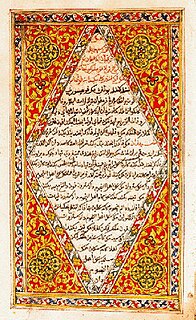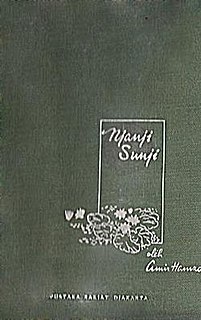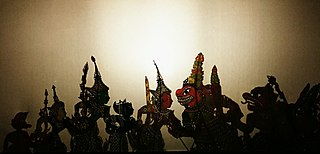Related Research Articles

Silat Melayu, also known as Seni Persilatan Melayu or simply Silat, is a combative art of self-defence from the Malay world, that employs langkah ('steps') and jurus ('movements') to ward off or to strike assaults, either with or without weapons. Silat traced its origin to the early days of Malay civilisation, and has since developed into a fine tradition of physical and spiritual training that embodies aspects of traditional Malay attire, performing art and adat. The philosophical foundation of modern Malay Silat is largely based on the Islamic spirituality. Its moves and shapes are rooted from the basis of Silat movements called Bunga Silat, and Silat performances are normally accompanied with Malay drum assembles.
Pantun is a Malay oral poetic form used to express intricate ideas and emotions. It is generally consists of even-numbered lines and based on ABAB rhyming schemes. The shortest pantun consists of two lines better known as the pantun dua kerat in Malay, while the longest pantun, the pantun enam belas kerat have 16 lines. Pantun is a disjunctive form of poetry which always come in two parts, the first part being the prefatory statement called pembayang or sampiran that has no immediate logical or the narrative connection with the second or closing statement called maksud or isi. However, they are always connected by the rhymes and other verbal associations, such as puns and repeating sounds. There is also an oblique but necessary relationship and the first statement often turns out to be a metaphor for the second one. The most popular form of pantun is the quatrain, and the couplet (two-lines), which both featured prominently in the literature and modern popular culture.

Hang Tuah was a warrior who lived in Malacca during the reign of Sultan Mansur Shah in the 15th century. He was supposedly the most powerful of all the laksamana, or admirals, and is considered by the Malays to be one of history's greatest silat masters. Hang Tuah is held in the highest regard, even in present-day Malay culture, and is arguably the most well-known and illustrious warrior figure in Malay history and literature. There is much in dispute about the specifics of Hang Tuah's story.

The Malay Annals, originally titled Sulalatus Salatin, is a literary work that gives a romanticised history of the origin, evolution and demise of the great Malay maritime empire, the Malacca Sultanate. The work which was composed sometime between the 15th and 16th centuries, is considered one of the finest literary and historical works in the Malay language.

Zapin is one of the most popular dance and musical forms in traditional Malay performing arts. Dance movements are choreographed to melodies which are performed using musical instruments such as the gambus, accordion and rebana. It is believed to have been introduced by Persian and Arab Muslim missionaries from the Middle East to Malay Archipelago around the fourteenth century where back then only males were allowed to perform; nowadays, female dancers are included. It used to be performed exclusively for religious ceremonies but through the years it has become a form of traditional entertainment, hence the participation of female dancers is allowed.
Ahmadun Yosi Herfanda, is an Indonesian journalist and poet. His name is also written as Ahmadun YH, Ahmadun Y. Herfanda, Ahmadun Herfanda, or AYH (ayeha). Ahmadun's poetry focuses on social and religious themes and is informed by Sufism. He is a reporter and arts editor at the daily newspaper Republika. Now he is known as a famous Indonesian poet and writer.

Indonesian literature is a term grouping various genres of South-East Asian literature.

Sitor Situmorang was an Indonesian poet, essayist and writer of short stories. Situmorang was born in Harianboho, North Sumatra, and educated in Jakarta. He worked as a journalist and literary critic in Medan, Yogyakarta and Jakarta for a variety of newspapers and periodicals.

The following is an alphabetical list of topics related to the Republic of Indonesia.

Toeti Heraty was an Indonesian poet. She has been singled out as the "only woman amongst the leading contemporary Indonesian poets".

Njanji Soenji is a 1937 poetry collection by Amir Hamzah. Written some time after the poet was forced to marry the daughter of the Sultan of Langkat instead of his chosen love in Java, this collection consists of 24 titled poems and pieces of lyrical prose, none of which are dated. First published in the magazine Poedjangga Baroe, the collection has been republished as a stand-alone book several times.
Darmanto Jatman was an Indonesian poet and writer. He was an Emeritus Professor at the Faculty of Psychology, Diponegoro University (UNDIP), Semarang. He was known as a humanist, philosopher and poet of Indonesia. He gave birth to the establishment of the Faculty of Psychology at UNDIP and became the first professor in the faculty. On 27 July 2007, Susilo Wibowo of UNDIP gave him the title of Professor, exactly a month before he retired, so that he was immediately given the title of Emeritus Professor.

Boeah Rindoe is a 1941 poetry collection by Amir Hamzah. The poems date to Amir's first years in Java, between 1928 and 1935. According to Anthony Johns of Australia National University, the poems are arranged chronologically, as indicated by Amir's increasing maturity as a writer while developing the poems. The collection includes twenty-three titled poems and two untitled pieces. Ten of the poems had previously been published, including Amir's first published works, "Mabuk..." and "Sunyi".

Classical Malay literature, also known as traditional Malay literature, refers to the Malay-language literature from the Malay world, consisting of areas now part of Brunei, Singapore, Malaysia, and Indonesia; works from countries such as the Philippines and Sri Lanka have also been included. It shows considerable influences from Indian literature as well as Arabic and Islamic literature. The term denotes a variety of works, including the hikayat, poetry, history, and legal works.

Soeman Hasibuan better known by his pen name Soeman Hs, was an Indonesian author recognized for pioneering detective fiction and short story writing in the country's literature. Born in Bengkalis, Riau, Dutch East Indies, to a family of farmers, Soeman studied to become a teacher and, under the author Mohammad Kasim, a writer. He began working as a Malay-language teacher after completing normal school in 1923, first in Siak Sri Indrapura, Aceh, then in Pasir Pengaraian, Rokan Hulu, Riau. Around this time he began writing, publishing his first novel, Kasih Tak Terlarai, in 1929. In twelve years he published five novels, one short story collection, and thirty-five short stories and poems.
Kassim Ahmad was a Malaysian Muslim philosopher, intellectual, writer, poet and an educator. He was also a socialist politician in the early days of Malaya and later Malaysia and was detained without trial from 1976 to 1981 under Malaysia's Internal Security Act.

Pencalang is a traditional merchant ship from Nusantara. Historically it was called as pantchiallang or pantjalang. It was originally built by Malay people from the area of Riau and the Malay Peninsula, but has been copied by Javanese shipwrights. By the end of the 17th century this ship has been built by Javanese and Chinese shipbuilders in and around Rembang. However it was a popular choice for Balinese skippers followed by Sulawesian skippers.

Malaysian folklore is the folk culture of Malaysia and other indigenous people of the Malay archipelago as expressed in its oral traditions, written manuscripts and local wisdoms. Malaysian folklores were traditionally transmitted orally in the absence of writing systems. Oral tradition thrived among the Malays, but continues to survive among Orang Asli and numerous bornean ethnic groups in Sarawak and Sabah. Nevertheless, Malaysian folklores are closely connected with classical Malay folklore of the region. Even though, Malay folklore tends to have a regional background, with the passing of time, and through the influence of the modern media, large parts of regional Malay folklore have become interwoven with the wider popular Malaysian folklore.
References
- ↑ "Taufik Ikram Jamil". IDWRITERS. 2017-05-06. Retrieved 2020-08-28.
- 1 2 "Indonesian Visual Art Archive | Karya-Karya Taufik Ikram Jamil". archive.ivaa-online.org. Retrieved 2020-08-28.
- ↑ "Ternyata, UAS Merindukan Penyair". riaueditor.com. Retrieved 2020-08-28.
- ↑ Ikram Jamil, Taufik (2015). What's Left & Other Poems. Jakarta: Lontar. ISBN 978-602-9144-98-7.